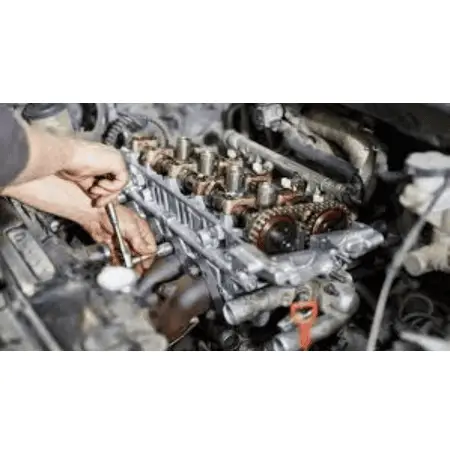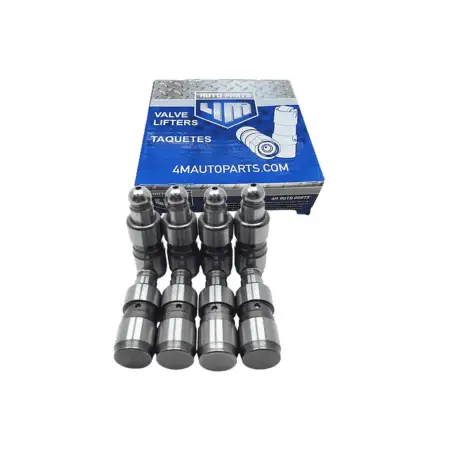Can You Drive with Bad Lifters?” So, keep on reading to discover whether it’s wise to hit the road with those troublesome lifters!”
If your car has bad lifters, it’s not a good idea to keep driving without addressing the issue. Bad lifters can make your engine noisy and might lead to more significant problems over time. Ignoring these issues can affect your car’s performance, and fuel efficiency, and even risk causing damage to the engine. It’s better to have a mechanic check and fix the bad lifters to ensure your car runs smoothly and avoid more extensive and costly repairs later.

Symptoms of Bad Lifters
When a vehicle’s lifters are not functioning properly, several noticeable symptoms may indicate a problem. Here are some detailed explanations of the symptoms of bad lifters:
1- Ticking or Tapping Noises:
One of the most common signs of bad lifters is a ticking or tapping noise coming from the engine. This sound occurs when the lifters fail to properly pump and maintain oil pressure, leading to increased friction and noise in the engine.
2- Poor Engine Performance:
Bad lifters can affect the overall performance of the engine. You might notice a decrease in power, sluggish acceleration, or difficulty maintaining a consistent speed. This happens because the lifters play a crucial role in controlling the valve timing and, consequently, the engine’s efficiency.
3- Misfiring or Rough Idling:
If the lifters are not working correctly, it can result in misfires or a rough idle. The improper functioning of lifters can disrupt the normal firing sequence of the engine cylinders, leading to a shaky or uneven idle.
4- Check Engine Light:
A malfunctioning lifter can trigger the vehicle’s onboard computer to illuminate the check engine light on the dashboard. This occurs when the engine’s sensors detect irregularities in performance or emissions.
5- Increased Fuel Consumption:
Inefficient lifters can contribute to poor fuel economy. When the lifters are not working properly, the engine has to work harder to compensate for the reduced performance, leading to increased fuel consumption.
6- Overheating:
Bad lifters may result in inadequate lubrication and increased friction within the engine. This can contribute to overheating issues as the engine struggles to dissipate heat efficiently.
7- Visible Smoke from Exhaust:
If the lifters are causing problems with the valve operation, it can lead to the burning of excessive oil. This may produce visible smoke from the exhaust, indicating potential lifter issues.
8- Difficulty Starting the Engine:
Faulty lifters can also impact the starting of the engine. If the lifters do not properly adjust the valve clearance, it can lead to difficulty in starting the vehicle, especially in cold conditions.

Causes of Bad Lifter Issue
Lack of Oil:
Lifters need oil to work smoothly. If there’s not enough oil or it’s not reaching the lifters properly, they can get noisy or fail to operate correctly. Regular oil changes and proper oil levels are crucial.
Dirty Oil:
When the oil gets dirty or contaminated, it can lead to sludge buildup. This sludge can clog the lifters, making them less effective. Keeping the oil clean through regular changes helps prevent this issue.
Wear and Tear:
Over time, the parts inside the lifters can wear out. This can happen due to the constant movement and pressure they experience while the engine is running. Regular maintenance can help catch and address wear and tear early on.
Incorrect Adjustments:
Sometimes, the lifter’s valve clearance may not be set correctly. This can happen during engine repairs or if adjustments are not done accurately. Proper adjustments ensure that the lifters work as they should.
Air in the Oil System:
Air bubbles in the oil can disrupt the lifter’s operation. This might occur due to leaks, improper oil changes, or other issues with the oil circulation system. Ensuring a well-sealed oil system helps prevent this.
Engine Overheating:
If the engine gets too hot, it can affect the lifter’s performance. Overheating may lead to oil breakdown or cause parts to warp, impacting the lifter’s ability to function correctly. Proper cooling system maintenance helps prevent this.
Poor-Quality Oil:
Using low-quality or the wrong type of oil can harm the lifters. It’s essential to use the oil recommended by the vehicle manufacturer to ensure proper lubrication and functioning of the lifters.
Debris in the Oil:
Foreign particles in the oil, like dirt or metal fragments, can damage the lifters over time. Regular oil filter changes help trap these particles and prevent them from reaching and harming the lifters.
Must Read
- How To Clear Service Suspension System? Explained
- Should I Wax My Car After Every Wash? Explained
- Why Does My Coolant Reservoir Keep Emptying?
- Why Red Light Blinking In Car And What To Do
- Benefits Of Removing Thermostat In A Car ( Pros And Cons )
Can You Drive with Bad Lifters
Driving with bad lifters is generally not recommended, and here’s why:
Engine Performance:
Bad lifters can affect the engine’s performance. You may experience reduced power, sluggish acceleration, and an overall decrease in the efficiency of your vehicle.
Increased Noise:
Faulty lifters often produce noticeable tapping or ticking noises. While these sounds might not cause an immediate breakdown, they can be annoying and may indicate underlying issues that need attention.
Risk of Engine Damage:
Bad lifters can lead to poor lubrication in the engine, increasing friction and wear on critical components. Continuing to drive with this issue may result in more severe damage to the engine, leading to costly repairs or engine failure.
Catalytic Converter Damage:
Unburned fuel and increased emissions caused by bad lifters can harm the catalytic converter. A damaged catalytic converter is not only expensive to replace but can also lead to emission control issues.
Reduced Fuel Efficiency:
Bad lifters can contribute to poor fuel economy. Ignoring the issue and continuing to drive with inefficient lifters may result in increased fuel consumption, costing you more in the long run.
Stranded on the Road:
While bad lifters might not cause an immediate breakdown, there’s a risk of unexpected engine issues, leading to the possibility of being stranded on the road. Ignoring the problem may result in a more severe breakdown, leaving you without a functioning vehicle.
Exacerbating the Problem:
Ignoring bad lifters can allow the problem to worsen over time. What might initially be a minor issue can escalate into more significant damage, leading to higher repair costs and potentially rendering your vehicle inoperable.
Safety Concerns:
In some cases, bad lifters can affect the proper functioning of the engine, potentially impacting the safety of the vehicle. For example, if the engine misfires or experiences a sudden loss of power while driving, it can create hazardous situations on the road.
While it might be tempting to continue driving with bad lifters to delay repairs, it’s generally not a wise decision
Conclusion
Driving with bad lifters is not recommended. While it might be tempting to ignore the tapping or ticking sounds, these issues can lead to more significant problems, compromising your car’s performance and potentially causing engine damage. Remember, when it comes to your car’s health, addressing concerns early is the key to a smoother and safer driving experience.
